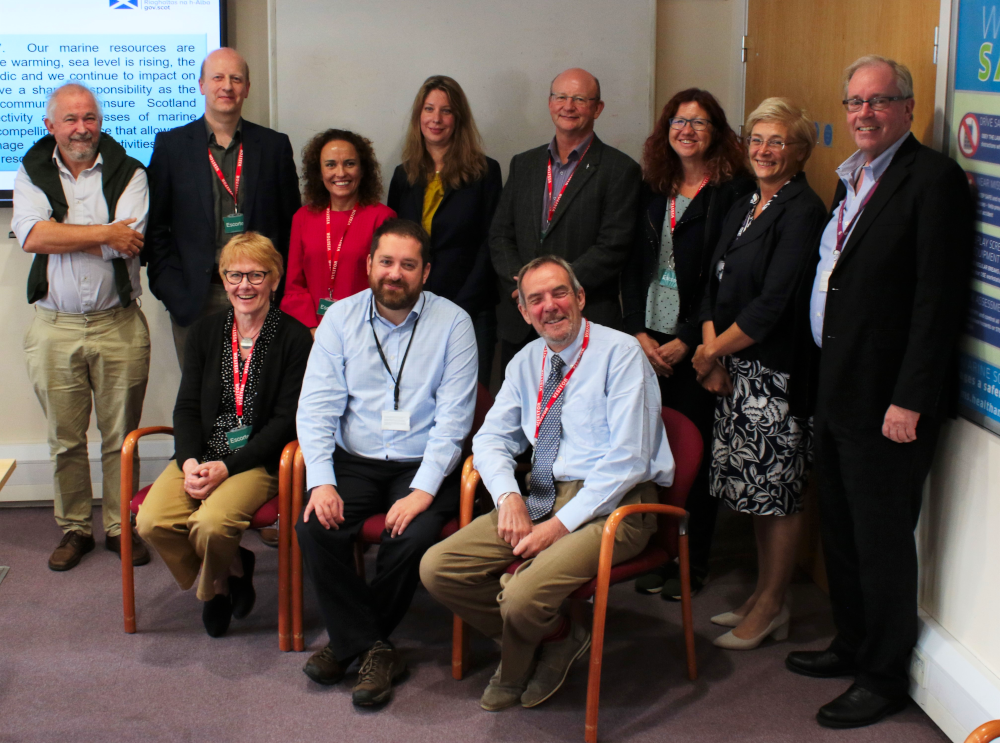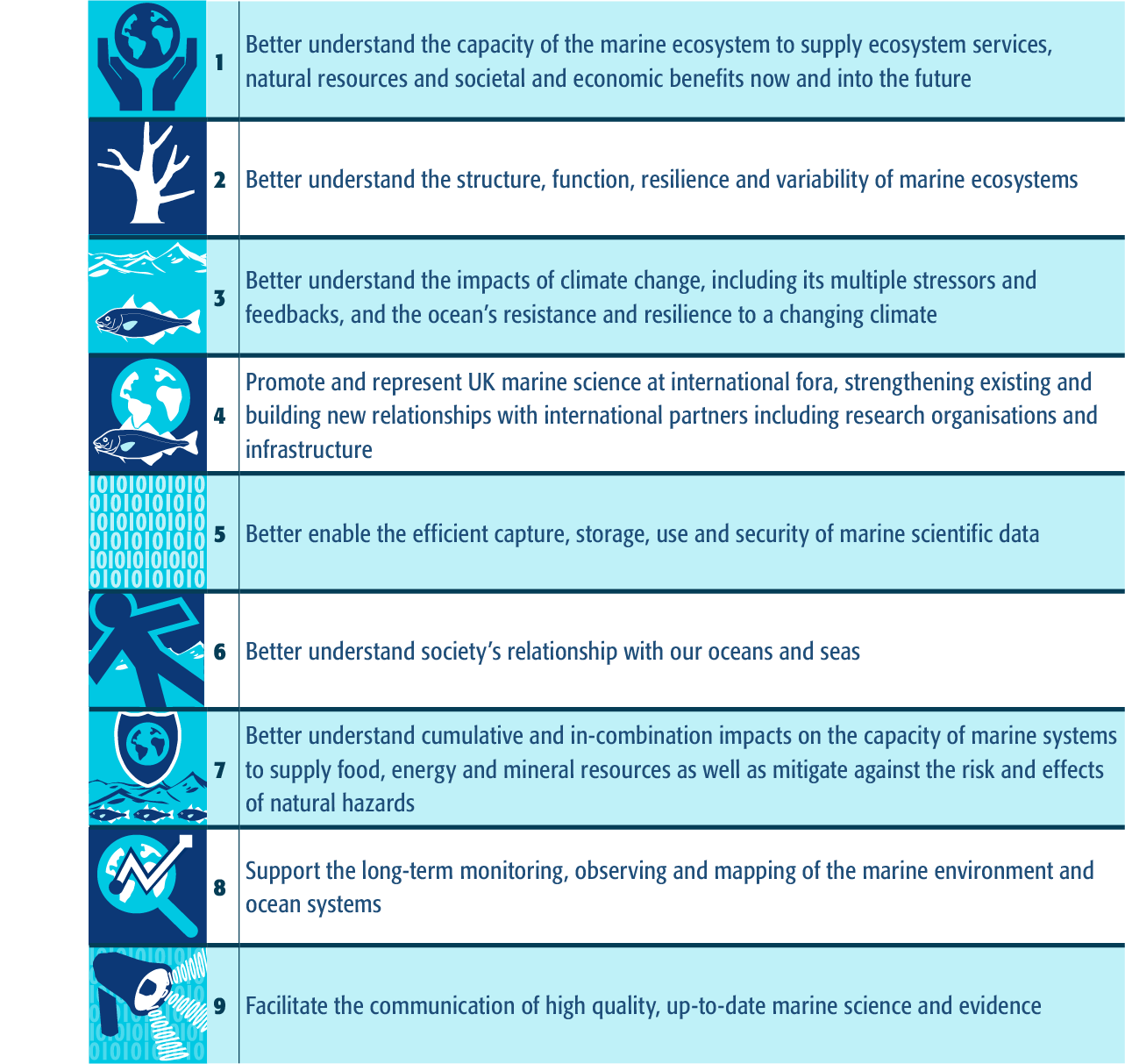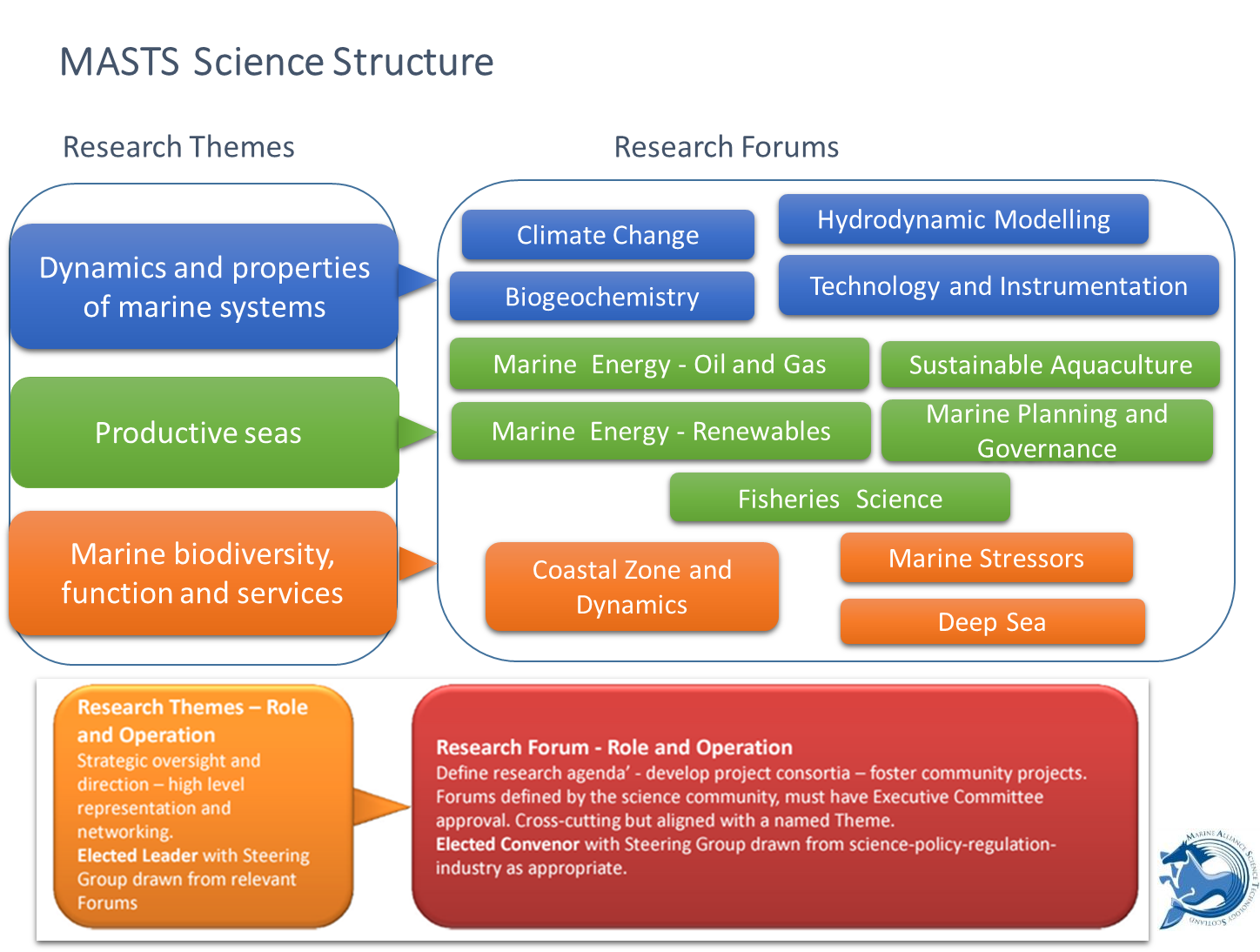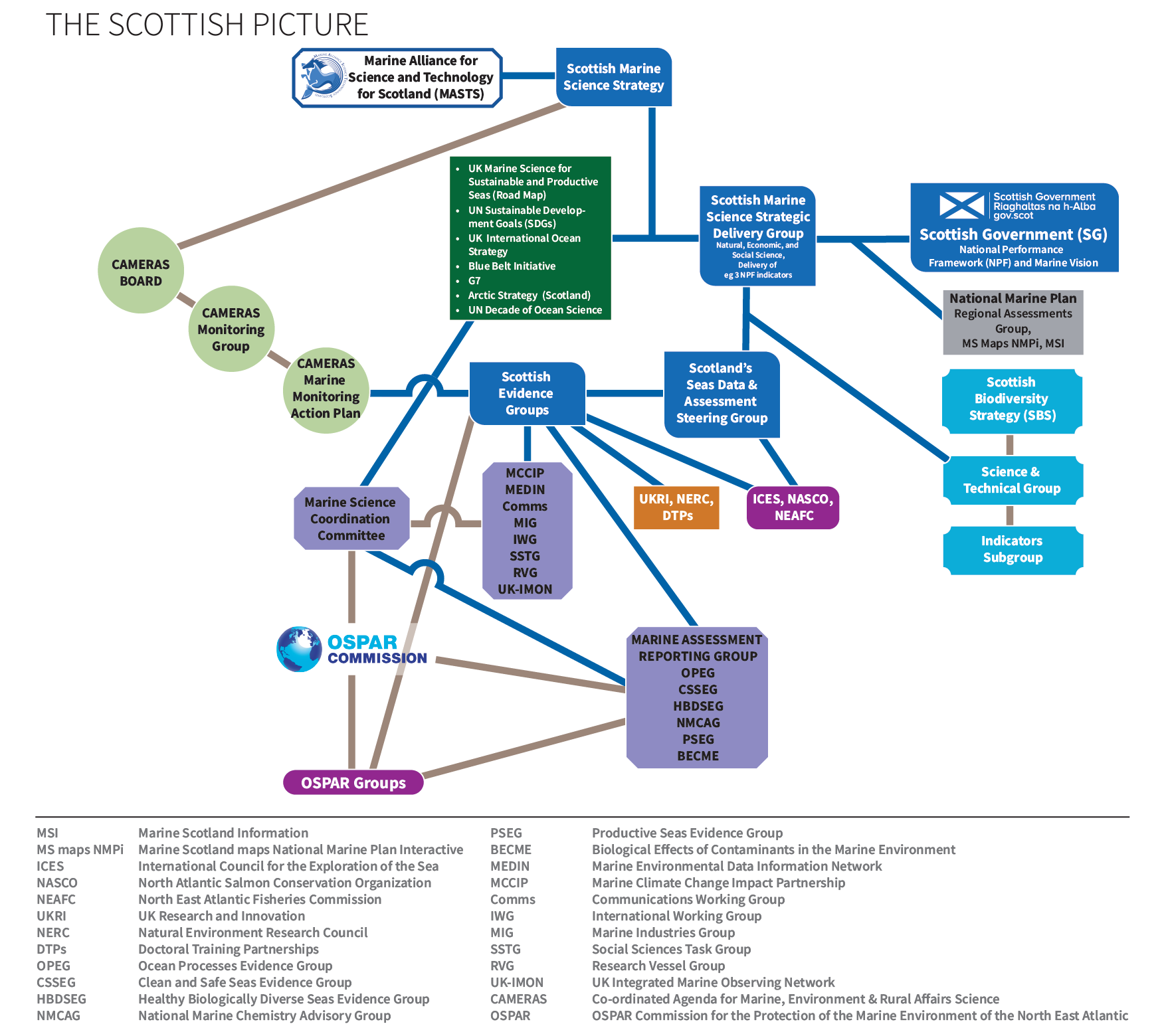Infrastructure
Working together in/for Scotland
Key to managing the human activities having an impact on Scottish seas is to have a coordinated and clearly understood management system that recognises the mobile nature of the seas. To that end, Scotland plays a major role in UK marine research, monitoring and assessment. SMA 2020 uses common indicators and the new Scottish Marine Science Strategy is being developed around the nine high-level science and evidence priorities presented in the UK Marine Science Road Map. The Scottish marine science 'web' (Figure 1) illustrates the interconnectivity between the various initiatives operating in Scotland which include the National Marine Plan, Scottish Biodiversity Strategy, the National Performance Framework and the Scottish academic community which meshes through the Marine Alliance for Science and Technology for Scotland. In addition, the link between terrestrial, freshwater and marine is achieved through the Coordinated Agenda for Marine, Environment and Rural Affairs Science (CAMERAS). The wider UK coordination is achieved by the Marine Science Coordination Committee and its committees and working groups that link directly with Scottish working groups. Finally, there is a correlation with delivery at the scale of the North-East Atlantic through the OSPAR Commission.
These many initiatives are described in more detail below.
Marine Scotland has worked with stakeholders through the Marine Strategy Forum established in July 2009. The Forum provides advice on Marine Scotland's main strategies and priorities.
There is a range of other management structures which have a marine element, including:
- inshore fisheries: the Regional Inshore Fishery Groups (RIFGs).
The RIFGs are non-statutory bodies and were established in 2016. They succeed the six Inshore Fisheries Groups (IFGs) that were formerly in place from 2013-16. The RIFGs aim to improve the management of inshore fisheries in the 0-6 nautical mile zone of Scottish waters, and to give commercial inshore fishermen a strong voice in wider marine management developments.
The Regional IFG network includes:- North & East Coast RIFG
- West Coast RIFG
- Outer Hebrides RIFG
- Orkney Management Group
- Shetland Shellfish Management Organisation
- coastal management: Regional Marine Planning Partnerships and local coastal partnerships.
- water management: the river basin management area advisory groups.
- Scottish Government launched the Scottish Blue Carbon Forum in 2018 to begin to identify and map the blue carbon resource in Scottish waters. The Forum is overseeing a blue carbon research programme that will measure the ability of the marine environment to store carbon dioxide and mitigate against the effects of climate change. The programme consists of post-doctoral and PhD researchers and studentships to further understanding of blue carbon capture and storage, and begin developing knowledge of how disturbance of the seabed affects these processes. Marine Scotland is working in partnership with Scottish universities and NatureScot. Blue carbon case studies, from early work in this research programme, are included in this assessment for maerl, seaweed and sediment.
The top 10 cm of our marine sediments hold 9 time more carbon than all of our surficial terrestrial carbon stores.
The Scotland's Seas Data and Assessment Group, with a membership taken from Marine Scotland, SEPA, NatureScot, JNCC and MASTS, oversees marine assessment reporting in Scotland. SSDAG published Scotland's Marine Atlas (2011) and has continued to build the evidence base for marine planning and assessment reporting, culminating in Scotland's Marine Assessment 2020.
The Sottish Marine Science Strategy is in its final stages of development (April 2020). The Strategy is being developed by members of the Scottish Marine Science Strategic Delivery Group which includes representatives from Scottish Government, SEPA, NatureScot, JNCC, Food Standards Scotland, The Sea Mammal Research Unit (SMRU), the Scottish Association for Marine Science (SAMS), Institute of Aquaculture, the Young Academy of Scotland and MASTS. The Strategy has been developed around the nine high–level Science and Evidence Priorities detailed in the UK Road Map. The Strategy has a focus on:
- Improving the understanding of:
- Natural systems meeting human needs
- Social, cultural and economic contexts
- Science and data needs
- Developing new methods/approaches relating to:
- Better metrics for assessing status and trends
- Societal engagement
- Policy development
- Science Gaps
The Marine Science Coordination Committee (MSCC) was formed in 2009 at the request of the UK Government and Devolved Administrations. Its role is to:
- Improve collaboration and co-ordination of scientific knowledge, resources and communication;
- Identify high-level science priorities for the UK;
- Align and develop UK marine science capacity, and
- Support UK evidence needs for policy decisions.

Figure 2: Members of the Scottish Marine Science Strategy Delivery Group at their inaugural meeting in 2019.
The Committee has a wide membership from across the UK Government departments, Devolved Administrations, other funding agencies and the marine academic community. The MSCC overseas a number of Committees and Working Groups (Figure 1) that are responsible for delivering the data and advice to meet statutory requirements. This includes:
- Marine Climate Change Impacts Partnership (MCCIP)
- Marine Environmental Data and Information Network (MEDIN)
- UK-Integrated Marine Observing Network
- International Working Group
- Marine Industries Group
- Communications Working Group
- Social Sciences Task group
- Research Vessel Group
The UK Road Map for Marine Science is a technical document produced by the MSCC. Central to this document are the nine high-level science and evidence priorities that were developed to guide the work of the MSCC and that of its partnership initiatives and working groups from 2019 to 2025 (Figure 3). These high-level priorities build upon those of the UK Marine Science Strategy 2010 – 2025 by taking a more comprehensive view of social and economic interests nationally and internationally.
The UK Marine Monitoring and Assessment Strategy (UKMMAS) brings together all those bodies with responsibilities for monitoring and assessment in UK seas, including the appropriate Scottish Evidence Groups. The UK bodies sit under the Marine Assessment Reporting Group (MARG; see Figure 1) while the Scottish Evidence Groups have a direct line of reporting to Scotland's Seas data Assessment Steering Group (Figure 1). The UKMMAS community published the Marine Online Assessment Tool (2018) as the assessment of the UK seas required under the Marine Strategy Framework Directive. UKMMAS had previously published Charting Progress 2 (2010) an integrated assessment of UK seas. In addition, the data from the monitoring activities are submitted to international data archive centres including those at the International Council for the Exploration of the Sea (ICES; Figure 1) which enables their utilisation in international assessments including the OSPAR Intermediate Assessment 2017.

Figure 3: The MSCC's nine high-level science and evidence priorities.
The Marine Alliance for Science and Technology for Scotland (MASTS) helps to co-ordinate marine science and its members represent the majority of Scotland's marine science capacity in academia and the public sector.
- MASTS is a research pool that was initiated in 2009 with £75 million of funding contributed by a combination of its member organisations and the Scottish Funding Council.
- Promoting an ethos of co-operation and trust, MASTS continues to evolve as an organisation, expanding its membership to 17 organisations involving more than 1,000 researchers and doctoral candidates.
- From its inception, MASTS was charged with delivering wider societal value as well as contributing to the goal of providing research and knowledge to underpin our vision of clean, healthy, safe, productive and biologically diverse oceans and seas.
- The public investment in MASTS has helped to raise the profile of marine science and the marine environment more generally. It has resulted in significant additional investment in marine science capacity in Scotland supporting the recruitment of 40 new staff and stimulating £30 million of new infrastructure development including the new Gatty Marine Laboratory at the University of St Andrews and the Lyle Centre at Heriot Watt University for example. Seedcorn investment by MASTS of £53K to the development of EU proposals, has resulted in more than £15 million in return from successful projects. The MASTS-led Scottish Universities Partnership for Environmental Research Doctoral Training Partnership has brought more than £5 million in NERC doctoral training funds to Scotland that will support ~100 PhD studentships by 2022. This builds on the 80 PhD studentships that have been support through the MASTS Graduate School.
- The MASTS Annual Science Meeting is the largest gathering of marine researchers in the UK attracting more than 450 delegates from academia, government, industry and other stakeholders.
- MASTS is now recognised as a key point of contact for the UK Science and Innovation Network, raising the profile and reputation of Scottish marine science at UK, EU and wider international level.
- MASTS works closely with a number of the Innovation Centres, the Society for Underwater Technology, the Institute of Marine Engineering, Science and Technology and thus has close links with many of the major industry sectors active in the marine environment.
- MASTS represents Scottish marine science on the UK Marine Science Co-ordination Committee, the National Oceanography Centre Association Board, the European Marine Board, and the European Marine Biological Resources Centre.
- MASTS engages with social, economic and behavioural disciplines through its developing behavioural change initiative and the UKRI Sustainable Management of UK Marine Resources Programme.
- Through its Forums, MASTS actively engages the marine science community and relevant stakeholders ensuring that collectively we remain at the forefront of tackling climate change and the sustainable management of our marine resources.

Figure 4: MASTS science structure. MASTS has three overall Research Themes reflecting the Scottish National Marine Plan and supported by 12 research forums, proposed and organised by the marine community.


